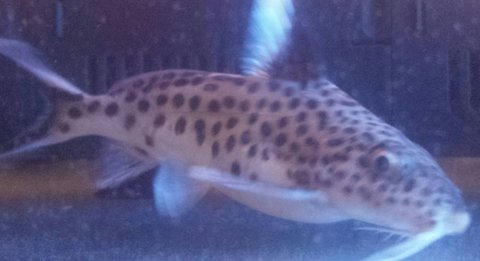Page 1 of 1
Synodontis question
Posted: 06 Nov 2015, 19:17
by pleconut
About a month ago I brought what I was told an adult synodontis multipunctatus. But although he looks like a multipuctatus do I have the right fish I'm asking as i found a recent article (I'm sure here on PC there's a wealth of info in regards to this) about the identification of cuckoo catfish questioning whether it is the multipunctatus or the grandiops as the true cuckoo catfish the conclusion being the grandiops displays true cuckoo characteristics whereas the

multipunctatus actually doesn't. The fish I have is about 5 inches long but his eyes are big has a bit of a pot belly i dont think this is health related without netting him I was told he was a male and counting the fin rays to tell the difference to conclude whether he is a multipunctatus or grandiops and if indeed he is a male. I'm putting here a picture of my fish im asking as i was going to buy another cuckoo catfish the difference being if the one I have is a multipunctatus (ive edited my post i put grandiops before) according to the article the multipunctatus grows bigger this means and he isn't actually full size yet but if a grandiops i have space for two. If anyone can tell whether he is a multipunctatus or grandiops just from the picture I'd appreciate your feedback.
Re: Synodontis question
Posted: 07 Nov 2015, 03:45
by Birger
This picture will not do for a proper ID....sorry.
What you can do is to take a picture of a pelvic fin, and then count fin rays which takes away all guesswork when trying to discern between the two for a hobbyist...
S. multipunctatus and S. grandiops are most reliably separated by pectoral-fin ray counts with S. mutipunctatus having 1 pectoral fin spine with 8 soft rays and S. grandiops having a count of 1, 7 . The soft pectoral-fin elements (i.e. the rays) are almost always branched (the only exception being the last one or two rays, which are sometimes unbranched) a ray is counted as one at its base before it branches out.
Birger
Re: Synodontis question
Posted: 07 Nov 2015, 08:35
by pleconut
I will either try to get a clearer picture of the pectoral fin or it may be a case of netting him to have a closer look i have read the profiles of multipunctatus and grandiops. In terms of a picture he's very active doesn't stay still long enough but wanted to avoid netting him if possible.
Re: Synodontis question
Posted: 07 Nov 2015, 09:58
by Richard B
The ray count is indeed the definitive way to tell the species apart but in order to do this it either needs to be in a small photo tank or netted.
That said if I had to say, it has the 'feel' of multipunctatus as the eye looks smaller as a % of snout length compared to grandiops although this has to be checked from a square side on view
Re: Synodontis question
Posted: 07 Nov 2015, 11:09
by pleconut
I have tried to take a pic in the main tank. No luck as he moves too fast. Then tried netting him. Failed twice and now there's that thing going on when the fish seems to know it's him you're trying to catch it I will attempt again a bit later. In terms of the article it's in a magazine i found on Google search
ISSUU pf6 2015 the link to http:// didn't work so ive re edited my post
-I'm not sure how to create a direct link to this in post -is the publication it's in and this is probably a question more appropriate for the taxonomic and science forum but seeing as I already have a topic going here didn't want to repeat it and create confusion my question in my relation to this article do both multipunctatus and grandiops display cuckoo characteristics in breeding or is it just one of them if so which, according to the article i read it's grandiops but I've seen on this forum and elsewhere that the multipunctatus has been bred with rift lake cichlids. Can anyone clear this up.